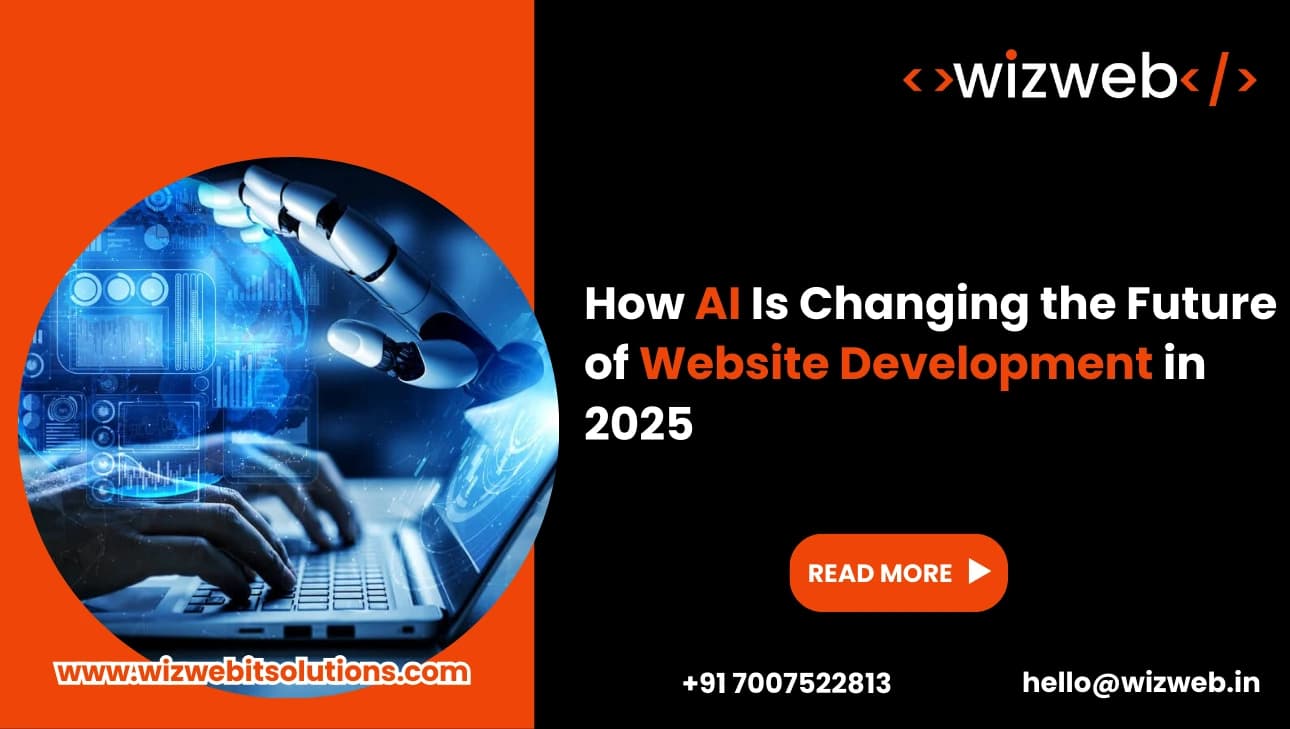Get in Touch
- Phone
+91 700 752 2813
- Email Now
hello@wizweb.in
Office No - 204 A-140, Sector 63 Road Noida, Uttar Pradesh 201301

Artificial Intelligence (AI) is transforming industries worldwide, and website development is no exception. By 2025, AI will play an even more significant role in shaping the future of website development. With its ability to automate tasks, improve user experiences, and offer powerful insights, AI is becoming an essential part of how websites are created, managed, and optimized.
In this article, we’ll explore how AI is changing the future of website development and why businesses need to adapt to these advancements.
AI tools are making web design and development faster and easier. In the past, building a website required writing complex code and spending countless hours on design. Now, AI-driven platforms can handle many of these tasks automatically.
By 2025, the future of website development will see more businesses using these tools to create responsive, professional-looking websites in record time.
Personalization is a key trend in the future of website development. AI analyzes user behavior, preferences, and interactions to create customized experiences. This means visitors to a website will see content, products, and layouts tailored just for them.
By offering these personalized experiences, businesses can improve user satisfaction and increase customer loyalty.
Search Engine Optimization (SEO) is essential for making websites visible on search engines like Google. AI tools are taking SEO to the next level by automating many of the time-consuming tasks involved.
In the future of website development, AI will help websites rank higher on search engines by continuously analyzing and adapting to changes in algorithms.
Accessibility ensures that websites can be used by everyone, including people with disabilities. AI is making it easier for developers to create accessible websites that comply with global standards.
As accessibility becomes a bigger priority, the future of website development will include more inclusive websites that serve a diverse audience.
Cybersecurity is a growing concern, and AI is helping to address this by identifying potential threats and protecting websites from attacks.
With these features, AI ensures that websites remain safe and secure, protecting both businesses and their customers.
Creating engaging content is a big part of website development. AI tools are now helping businesses generate high-quality content faster and more efficiently.
By 2025, businesses will rely even more on AI tools to keep their websites updated with fresh and relevant content. This will be a game-changer for the future of website development.
AI doesn’t just react to data—it predicts trends. Predictive analytics helps businesses understand what users want before they even ask for it.
By using these insights, companies can stay ahead of the competition and create better websites that meet user needs.
Low-code and no-code platforms are transforming the future of website development. These platforms allow users to build websites with minimal coding knowledge, using AI to fill in the gaps.
As these platforms become more advanced, more people will have the tools they need to bring their website ideas to life.
Testing and debugging are crucial steps in website development, but they can be time-consuming. AI is changing this by automating these processes.
By 2025, the future of website development will involve fewer bugs and faster updates, thanks to AI-powered testing tools.
While AI offers many benefits, it also brings challenges that need to be addressed.
To fully embrace the future of website development, businesses must find a balance between automation and human creativity.
The future of website development is exciting, and AI is at the heart of it all. From automating web design to creating personalized user experiences, AI is making websites smarter, faster, and more efficient. Businesses that adopt AI-driven tools will save time, reduce costs, and deliver better digital experiences to their users.
By 2025, AI will no longer be a luxury but a necessity in website development. Whether you’re building your first website or looking to improve an existing one, embracing AI can help you stay ahead in this fast-changing digital world.